- Home
- Isaac Hooke
Cradle of War (A Captain's Crucible Book 3) Page 2
Cradle of War (A Captain's Crucible Book 3) Read online
Page 2
He repealed the canceler. “Comm?”
“Still nothing,” the comm officer said.
Miko arrived and relieved the fifth watch tactical officer.
“Morning, Captain,” Miko said, rubbing his eyes. It was a little after midnight.
“Good morning, Lieutenant Miko,” Jonathan said cheerlessly. “Maxwell has brought you up to speed?”
“He has,” Miko confirmed. “A massive vessel emerged from the wormhole ahead of us and isn’t answering hails.”
A silo-shaped robot assistant deposited a steaming cup of coffee at Jonathan’s station, and then Miko’s. The two drank gratefully.
Jonathan returned his attention to the oddly formed vessel on the video feed. He magnified a portion of the object and the display pixelated slightly as digital zoom was applied. The gold hull seemed slightly translucent, and he saw the vague outline of structures inside.
“Ops, what does the CDC make of it?” Jonathan asked. CDC stood for Combat Direction Center, where all tactical and sensor data was processed by the ship’s AI and a team of specialists before being bundled up into something the bridge crew could use.
The fifth watch ops specialist spoke up. “The general shape matches the ruins of Elder vessels we’ve discovered in our own galaxy, including the wreckage on Achilles I in the Vega 951 system.” That was the system they had been exploring when they first encountered the Raakarr. Apparently the Raakarr had been using Vega 951 as some sort of breeding ground, but whether their usage of the Elder wreckage had been coincidence or necessity, no one knew.
“Apparently their ship design hasn’t changed much in the five hundred thousand years since they left our own galaxy,” the ops specialist finished.
“And I thought human beings were creatures of habit,” Jonathan said. “Kind of brings new meaning to the phrase, if it ain’t broke, don’t fix it.”
“Maybe they’ve forgotten how to build ships, and this is all they have,” the specialist said.
“Forgotten?” Jonathan said. “Doubtful. But if they managed to create ships that were completely self-sufficient and self-sustaining, I suppose at some point there would be no need to build any further vessels.” He stared intently at the golden shape. “So these are the Elder.” He couldn’t help the slight awe that slipped into his voice.
“There is one big difference between this ship and the ruins,” the ops specialist said.
“What’s that?” the captain asked.
“Structures of some kind seem to be housed underneath that hull,” the specialist answered. “We’ve never seen anything like it before. The Elder ruins found previously were all hollow inside.”
“I noticed them, too,” Jonathan said. “Does the CDC have any guesses on what those structures are?”
“They look almost like buildings,” the specialist said. “Grouped in clusters. It’s almost like... like there are entire cities housed within.”
Jonathan felt his brow furrow. “What are you saying, it’s some kind of generation ship? Or an artificial world?”
“No idea,” the specialist answered. “But there are no obvious weapon mounts, if that’s any consolation.”
“Not really.”
His eyes focused on the center of the display, where his own fleet resided, composed of six human vessels, plus the Raakarr defector ship, the Talon, thirty thousand kilometers off port. He still wasn’t quite sure of the latter’s allegiance, or intentions. Certainly, that dart-shaped alien ship had turned on the other Raakarr in the last battle, shooting down two of their own vessels. The action had caused the surviving Raakarr to flee.
There was a human telepath stationed aboard the defector vessel, a man named Barrick. The explanation the telepath had given for the unexpected help was members of the so-called Zarafe faction had risen up and usurped control of the ship from the other Raakarr, whom he called the Elk.
It was probably true, but Jonathan’s distrust for the telepath ran deep. After the man had awakened from his mind link with a captured alien six months ago, his psychic abilities had somehow skyrocketed, and Barrick had easily assumed control of the flagship. He had almost succeeded in making the bridge crew fire on their own vessels, but Maxwell and Stanley had saved them. He wondered if something similar had happened aboard the alien vessel. What if the telepath was controlling all of the defectors? It was certainly possible. Still, Jonathan had a feeling the alien minds were far too different from that of human beings to make such mass control feasible.
After that initial incident aboard the Callaway, Barrick had been sedated for six months, but had somehow awakened to kidnap the first officer’s wife, bringing her to the Raakarr. He had learned to speak to the aliens via telepathy in a suspiciously short amount of time, and then he had released his hostage, or rather, arranged for her escape with the help of some alien friends.
The telepath remained aboard the Talon, partly because Jonathan wouldn’t have accepted him back even if he wanted to return, but mostly to facilitate communications with the aliens. So while Jonathan didn’t entirely trust the man, and definitely didn’t like him, without Barrick there was no way to have any sort of dialog with the Raakarr. Again, that assumed Barrick wasn’t actually in control of the alien minds. And even if he was not, Jonathan couldn’t know with absolute certainty whether the telepath was truthfully delivering everything both parties said, and not altering the exchanges to suit his own hidden agenda.
Still, Jonathan had little choice for the moment. He almost wanted to send Robert or another officer aboard to act as a true liaison officer, but he was too worried about the Raakarr—and Barrick—taking another hostage.
“Get me the telepath,” the captain told the comm officer.
two
Jonathan waited impatiently for Barrick to tap in.
Several moments later the telepath’s voice came over his aReal.
“Good morning, Captain.” As usual, Barrick answered the request with audio only. “To what do I owe this late night call?”
“Don’t try to pretend you don’t know the news,” Jonathan said.
Barrick didn’t reply immediately. Then: “My apologies, Captain. I was in fact asleep, but Valor has now informed me of the situation.”
Valor was the leader of the Zarafe faction, and he currently served as captain of the Talon.
“The Raakarr know who these newcomers are, don’t they,” Jonathan said. It wasn’t a question, but a statement. He waited for a reply, but when none came after thirty seconds, he added: “Barrick?”
“A moment,” Barrick responded. Finally: “Valor says these are their ancestors.”
“Their ancestors?” Jonathan asked. Robert, his first officer, had theorized as much.
“Yes,” Barrick answered. “An ancient race, once resident in our own galaxy, though apparently they left it long ago. The same race humanity refers to as the ‘Elder:’ the makers of the Slipstreams that connect the sundry systems in our corner of the galaxy.”
“I asked you something before,” Jonathan continued. “But your friend Valor wouldn’t give me a straight answer. So I ask again: why did the Raakarr insist we go down to the surface of the greenhouse planet with them? They lied about not having exploratory shuttles... they could have 3D-printed more, just as they built those six ships to ambush us. They already knew we would find those anomalies down there, didn’t they? They knew we would be attacked by humanoid guardians. So what I want to know is, why bring us to the site?”
The line remained silent. Jonathan thrummed his fingers anxiously. Finally, after almost a minute, Barrick spoke again.
“Valor has agreed to answer the question,” the telepath said.
“Generous of him,” Jonathan replied.
“He says the Raakarr indeed recognized the site as an Elder breeding ground from orbit. They wanted to summon their ancestors in the hope the Elder would help the Raakarr return to their own galaxy. But the only way to summon them was by invading the nesting site. They were
afraid of the Elder’s wrath, so they spent six months building more ships in case they needed to defend themselves from their ancestors. But then the human fleet showed up and provided a convenient scapegoat. They wanted it to look like we humans were the actual invaders of the breeding grounds, and hoped that when the Elder came, they would show the Raakarr mercy.”
Jonathan felt a sinking feeling deep inside of him. He muted his microphone.
“We took the anomalies we found down on that planet,” the captain said quietly to Miko. “And recovered the bodies of those who were probably their guards. So even though the Raakarr lost three of their own down there, we played right into their little game. When the Elder find out we’ve taken their offspring, I doubt they’ll be very pleased.”
Miko frowned. “Probably not.”
“I must add,” Barrick said, oblivious to the exchange that had taken place between Jonathan and his tactical officer. “Valor claims the Zarafe faction had no involvement in any of that plotting. None whatsoever. He lays it squarely at the feet of the Elk faction.”
Jonathan unmuted his side of the connection. “He would do that, wouldn’t he? But why didn’t Valor try to stop them?”
“There was nothing he could do at the time,” Barrick responded. “Valor had to bide his time, waiting for his chance to strike, and when the opportunity arose he took it.”
Choosing a time that was convenient to him, of course, but not to us.
“Ask Valor about the humanoids who attacked us down there,” Jonathan said. “I want to know how they’re connected to the Elder.”
Barrick’s reply didn’t come immediately. Then: “Valor says he has answered enough of your questions for the moment. I’m sorry, Captain. I have to go.”
“Wait, will our weapons harm them? Our lasers? Our particle beams?”
“Valor says he doesn’t know.” The connection terminated.
Jonathan sat back and sighed. “I can’t believe how badly the Raakarr set us up.”
“Maybe we can return the eggs to the greenhouse planet?” Miko suggested.
“It’s looking like we’re going to have to,” Jonathan said. “I wanted to avoid moving toward the other side of the system while the six Raakarr were out there, but I don’t think we have a choice now.”
“The question is, do we stop by the nearest gas giant to refuel first, as we originally intended?” Miko asked. “Or head directly to the greenhouse planet?”
“I’m thinking we can’t forgo a refueling,” Jonathan said. “We have to be ready when this situation turns sour.”
The fleet had nearly exhausted all of their propellant in the last battle, and much geronium, which was the fuel that powered starship reactors. The fleet-wide inventories of offensive mortars and point defense slugs were similarly depleted, so while the Harvester vessel Grimm collected fuel, the rest of the task group would have to mine ammunition from the gas giant’s ring system.
“Once we’re done restocking,” Jonathan continued. “We can use the gravity well of the gas giant to slingshot us toward the greenhouse planet.”
“And if the six Raakarr decide to intercept us before we get there?” Miko asked.
“Then we blow them out of the stars,” Jonathan said simply. “Nav, bring us back on course toward the nearest gas giant. Give the newcomer a four million kilometer berth, at minimum. Prepare to engage at half speed: let’s not show them how fast we can travel. Miko, transmit the order to the fleet.”
“Course set,” the nav specialist responded.
“Helm, engage,” Jonathan said. “Half speed.”
“Engaging at half speed,” the helmsman echoed.
Jonathan waited a few moments. “Ops, is the Möbius strip making any attempt to follow?”
“Negative, sir,” the ops specialist said. “She’s just sitting there.”
“Notify me if that changes.” Not that they would be able to do very much if the newcomer did actually pursue, thanks to their low propellant levels.
He tapped in Lieutenant Connie Myers, the chief scientist.
Her hologram appeared in the center of the Round Table. Her long dark hair fell in disheveled locks around her face. Like Jonathan, she wore the spectacles version of the aReal.
She reached underneath her aReal with one hand and rubbed her eyes. “Morning, Captain.”
“My apologies, Lieutenant,” Jonathan said. “I forgot the time. I should have sent a message to your mailbox.”
“I couldn’t sleep anyway,” Connie said. “What can I do for you?”
“I need you to stop any experiments you’re performing or plan to perform on the specimens we collected from the greenhouse planet. I want them completely unharmed.”
“I had a batch of slightly invasive experiments planned for tomorrow, but I’ll cancel them,” Connie said.
“See that you do,” Jonathan said. “Our lives might very well depend on the well-being of those things.”
“What about the dead humanoid specimens?” Connie asked. “And their enhanced suits?”
“You may continue experimenting on them for the moment,” Jonathan said. “But I want them moved to a separate container.”
“I’ll make a note to do so first thing in the morning.”
“Thanks Lieutenant. Captain out.”
Jonathan terminated the call. He stared at the Möbius strip on his video feed.
Why won’t you move? he thought. Or otherwise make any attempt to contact us?
Perhaps it was for the best. Because if that ship came for them before they returned the anomalies to the planet, he somehow doubted their intentions would be peaceful.
three
The next few days passed in a tense blur. The task group gave the newcomer a four million kilometer berth and then proceeded toward the gas giant. During the entire voyage the Elder vessel hadn’t broken orbit, remaining above the Slipstream where it had emerged. Jonathan had the comm officers sending out hails hourly, but the new arrival still didn’t respond. The ops specialist confirmed that the Raakarr fleet—and the local defector—were similarly outputting the occasional gamma ray communications ping toward the Elder craft, however their radiation streams so far went unanswered.
By the time the task group reached the gas giant, the Elder ship resided six hundred million kilometers behind them. Jonathan felt somewhat safer at that range. The enemy Raakarr, meanwhile, had moved to twice that distance from the human fleet on the opposite side of the system, three hundred million klicks from the greenhouse planet.
The Grimm moved into low orbit around the gas giant and proceeded to deploy its collection device to sieve geronium and hydrogen. Via a special reactor, the latter was converted into helium—the inert gas used as propellant. The energy produced by the reaction was also employed to convert the geronium into a usable isotope.
The Aurelia mirrored the Grimm’s position in a higher orbit, keeping watch on the vessel. Meanwhile the rest of the task group concentrated on mining mortars and slugs from the ring system that surrounded the giant. Jonathan diverted the unused machinery of the Marley, the Builder ship in their midst, to the conversion process, which helped increase production threefold.
Jonathan also rerouted some of the raw materials toward repairs so that the drone swarms could continue the work they had begun on the Callaway after the first battle. Halfway to the gas giant the repair elements had run out, forcing a shutdown; but with the raw materials flowing freely again, the swarms had begun anew, 3D-printing superheated metal into the remaining gashes in the port side. When that was done, the swarms would focus on restoring damaged compartments and passageways, such as launch bay three and mess hall two. It would likely take a few more weeks before everything was restored, but Jonathan hoped to leave the gas giant in two or three days; the robot miners would stockpile the raw materials, ensuring that enough remained for the planned repairs and any subsequent work thereafter.
Roughly two days into the refueling and restocking operation, Ensign
Lewis, first watch ops officer, announced: “I’m detecting gamma ray emissions from the Elder ship. They’re low intensity, and appear to be communication-based.”
“Directed toward us?” Jonathan asked.
“Negative,” she said. “The pulses are aimed at the Raakarr fleet. I’m only picking up the residue.”
“So they’ve finally deigned to answer their descendants,” Robert mused from his seat beside the captain. The commander rubbed his earlobe. “It’s telling, isn’t it, who they chose to answer first?”
“It is,” Jonathan agreed. “Lazur, get me Barrick.”
“Aye, Captain,” the first watch comm officer answered.
Barrick tapped in, audio-only, a moment later. “Captain?”
Jonathan wished Barrick would tap in with video for once, because when someone constantly communicated via audio only, it made Jonathan feel the individual in question had something to hide. Then again, video couldn’t be trusted either, not when it could be readily manipulated by realtime digital image processing.
“Tell me our Raakarr allies can intercept that signal,” Jonathan told the telepath.
“Negative,” Barrick replied. “Like you, the Raakarr are only detecting aberrant photons that aren’t part of the original message. The pulses are highly directional.”
“Thank you,” Jonathan said. “It was worth a try. Captain out.”
He terminated the connection.
Shortly thereafter Ensign Lewis reported the Raakarr fleet had issued an answering gamma ray; the vessels proceeded to exchange short-wavelength messages like that for several subsequent hours, each communication and its corresponding response taking half an hour to propagate across the vast gulf between ships, as dictated by the speed of light.
The watches changed, and when the bursts subsided, Jonathan received a message in his quarters. He looped in Robert and Miko when he answered. He chose full visual mode, so that it appeared he was standing at the center of the Round Table on the bridge, with Miko and Robert at his side.

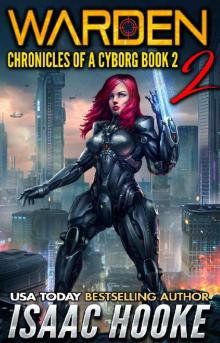 Warden 2
Warden 2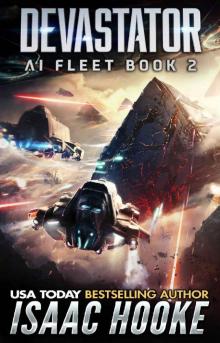 Devastator
Devastator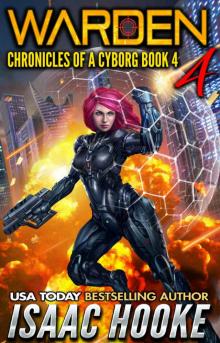 Warden 4
Warden 4 Emperor
Emperor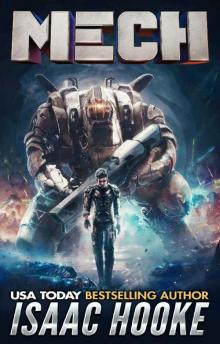 Mech
Mech Conqueror
Conqueror Fighter
Fighter The Forever Gate Ultimate Edition
The Forever Gate Ultimate Edition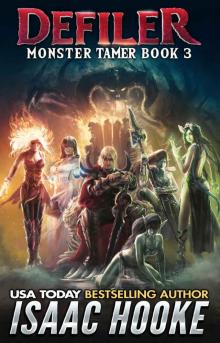 Defiler
Defiler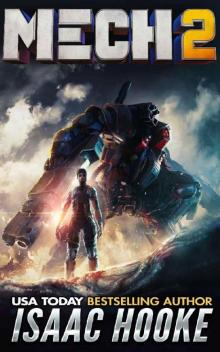 Mech 2
Mech 2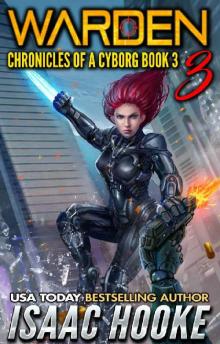 Warden 3
Warden 3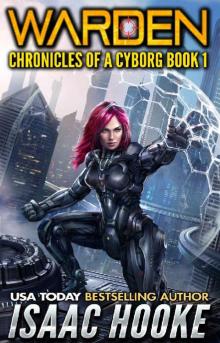 Warden 1
Warden 1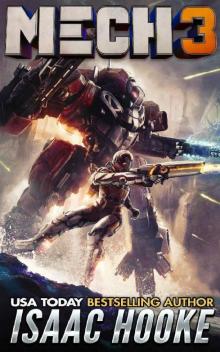 Mech 3
Mech 3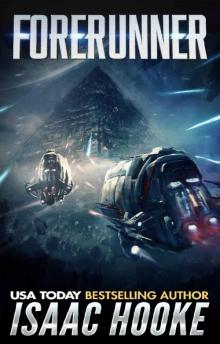 Forerunner
Forerunner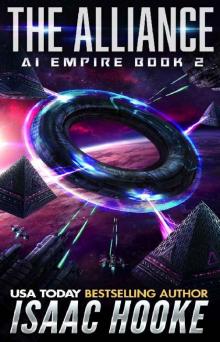 The Alliance (AI Empire Book 2)
The Alliance (AI Empire Book 2)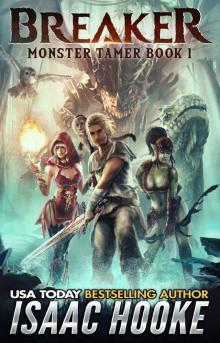 Breaker (Monster Tamer Book 1)
Breaker (Monster Tamer Book 1) Bender of Worlds
Bender of Worlds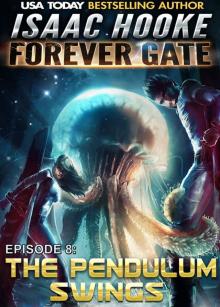 The Pendulum Swings (The Forever Gate Book 8)
The Pendulum Swings (The Forever Gate Book 8)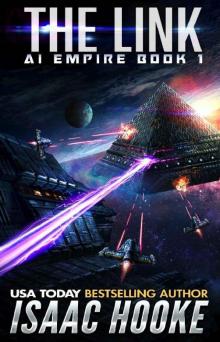 The Link
The Link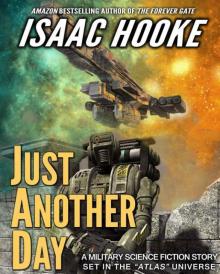 Just Another Day
Just Another Day Star Warrior
Star Warrior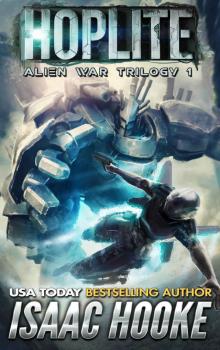 Alien War Trilogy 1: Hoplite
Alien War Trilogy 1: Hoplite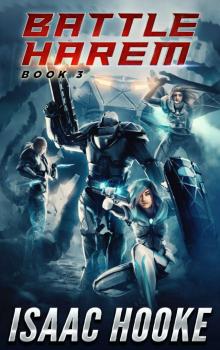 Battle Harem 3
Battle Harem 3 The Ethan Galaal Series: Books 1 - 3
The Ethan Galaal Series: Books 1 - 3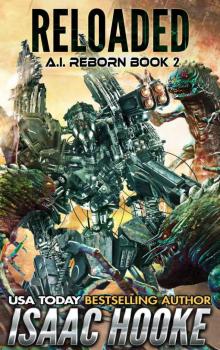 Reloaded
Reloaded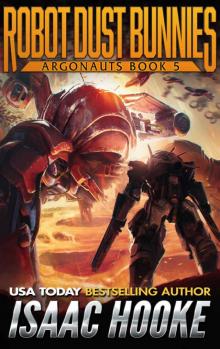 Robot Dust Bunnies (Argonauts Book 5)
Robot Dust Bunnies (Argonauts Book 5) Battle Harem
Battle Harem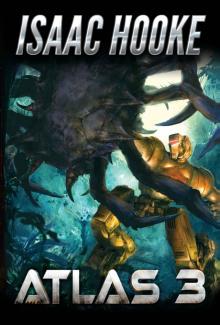 ATLAS 3 (ATLAS Series Book 3)
ATLAS 3 (ATLAS Series Book 3)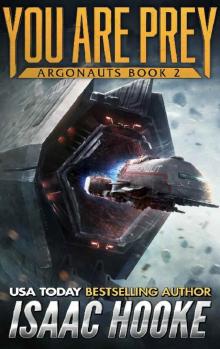 Argonauts 2: You Are Prey
Argonauts 2: You Are Prey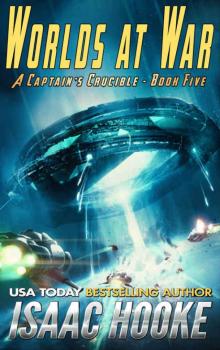 Worlds at War (A Captain's Crucible Book 5)
Worlds at War (A Captain's Crucible Book 5)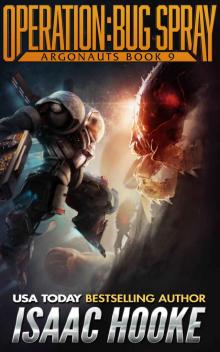 Operation: Bug Spray (Argonauts Book 9)
Operation: Bug Spray (Argonauts Book 9)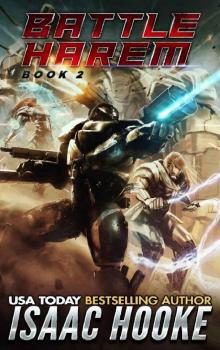 Battle Harem 2
Battle Harem 2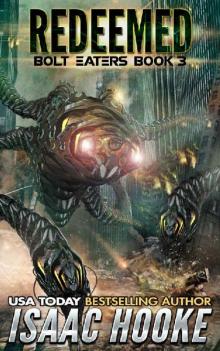 Redeemed (Bolt Eaters Trilogy Book 3)
Redeemed (Bolt Eaters Trilogy Book 3)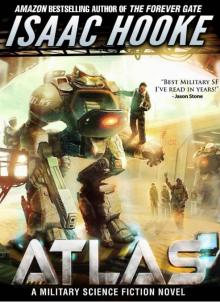 Atlas
Atlas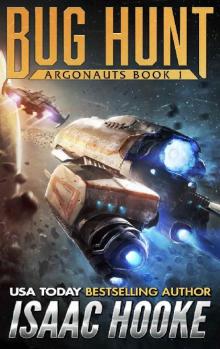 Argonauts 1: Bug Hunt
Argonauts 1: Bug Hunt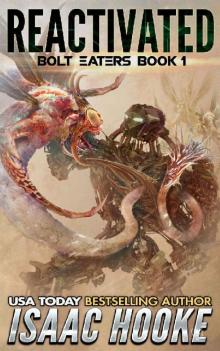 Reactivated (Bolt Eaters Trilogy Book 1)
Reactivated (Bolt Eaters Trilogy Book 1)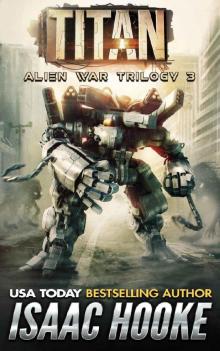 Alien War Trilogy 3: Titan
Alien War Trilogy 3: Titan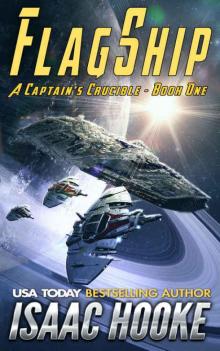 Flagship (A Captain's Crucible #1)
Flagship (A Captain's Crucible #1)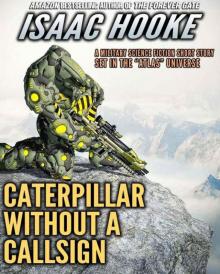 Caterpillar Without A Callsign
Caterpillar Without A Callsign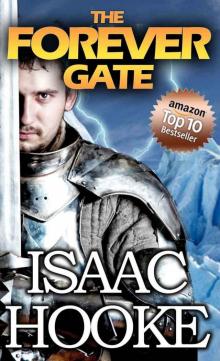 The Forever Gate
The Forever Gate He Who Crosses Death (Star Warrior Quadrilogy Book 3)
He Who Crosses Death (Star Warrior Quadrilogy Book 3)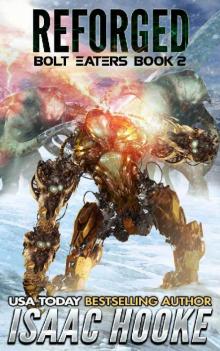 Reforged (Bolt Eaters Trilogy Book 2)
Reforged (Bolt Eaters Trilogy Book 2)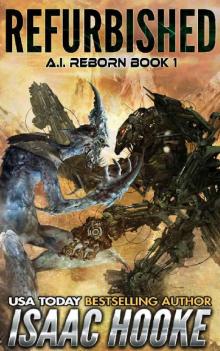 Refurbished
Refurbished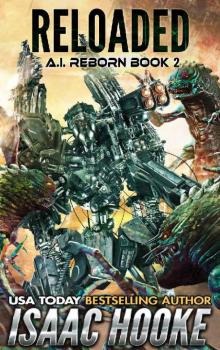 Reloaded (AI Reborn Trilogy Book 2)
Reloaded (AI Reborn Trilogy Book 2) He Who Crosses Death
He Who Crosses Death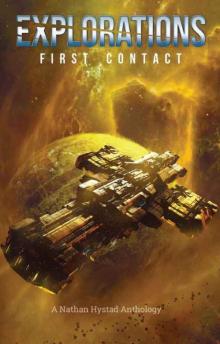 Explorations: First Contact
Explorations: First Contact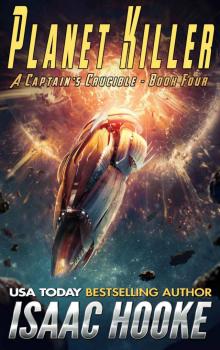 Planet Killer (A Captain's Crucible Book 4)
Planet Killer (A Captain's Crucible Book 4)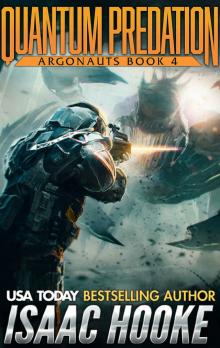 Quantum Predation (Argonauts Book 4)
Quantum Predation (Argonauts Book 4) Clandestine-IsaacHooke-FreeFollowup
Clandestine-IsaacHooke-FreeFollowup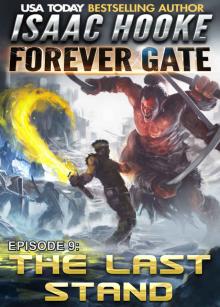 The Last Stand (The Forever Gate Book 9)
The Last Stand (The Forever Gate Book 9)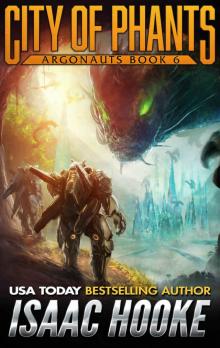 City of Phants (Argonauts Book 6)
City of Phants (Argonauts Book 6)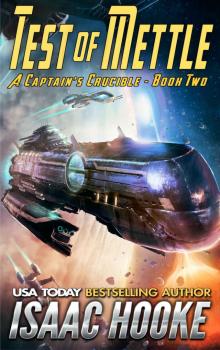 Test of Mettle (A Captain's Crucible Book 2)
Test of Mettle (A Captain's Crucible Book 2)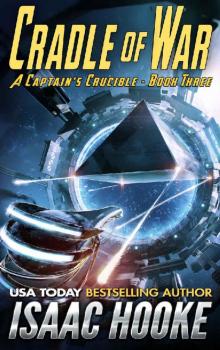 Cradle of War (A Captain's Crucible Book 3)
Cradle of War (A Captain's Crucible Book 3)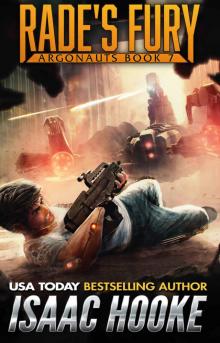 Rade's Fury (Argonauts Book 7)
Rade's Fury (Argonauts Book 7) Rebirth (The Forever Gate Book 6)
Rebirth (The Forever Gate Book 6) The Forever Gate Compendium Edition
The Forever Gate Compendium Edition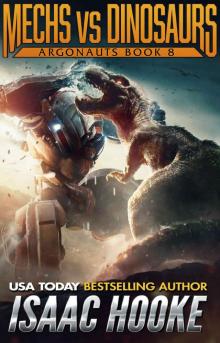 Mechs vs. Dinosaurs (Argonauts Book 8)
Mechs vs. Dinosaurs (Argonauts Book 8)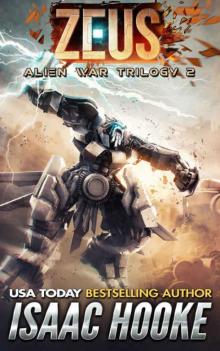 Alien War Trilogy 2: Zeus
Alien War Trilogy 2: Zeus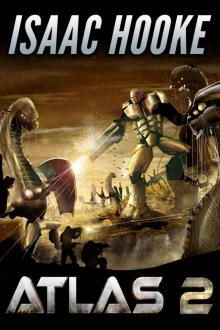 ATLAS 2 (ATLAS Series Book 2)
ATLAS 2 (ATLAS Series Book 2)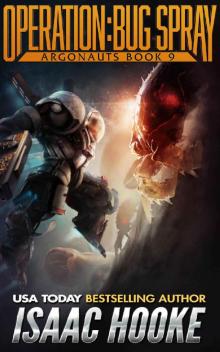 Operation_Bug Spray
Operation_Bug Spray